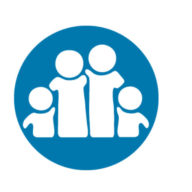
It’s ok to celebrate traditionally or completely differently this July 4th.
A year ago today our community experienced a collective trauma that impacted each of us differently. Some of us experienced direct violence, others experienced the tragedy through communication with family, friends and neighbors, while many more experienced it unfold through various news and social media outlets. So many of us were left explaining the unexplainable to our children, friends, and family far and wide.
Aspects of a traumatic experience can be coded in our memories in ways we may not even be aware (e.g., images, sounds, smells, feelings, etc.), and when revisited, those reminders can reactivate our traumatic response and really catch us off guard.
Naturally, as the Fourth of July is a long-celebrated and federally recognized holiday that is paired with this tragedy, it will be nearly impossible to escape reminders today. It is possible that we may suddenly find our bodies responding as if we are under threat. This can show up as physiological, emotional, behavioral, and/or cognitive reactions — regardless of how close we were to the traumatic event.
We (or others around us) may…
- become tense, and our emotions may be stronger and quicker to come to the surface;
- act more impulsively, be more irritable, protective, and grumpy;
- have difficulty thinking clearly;
- be reluctant to attend events or participate in large gatherings; or
- have difficulty falling asleep or feel overwhelmed.
One key fact to remember is that while feelings and reactions can be unsettling, uncomfortable, and painful, they are not dangerous.
 On this day, when it is nearly impossible to escape reminders of last year’s tragedy, we wanted to share some helpful tips from experts on trauma. Tips for Coping:
On this day, when it is nearly impossible to escape reminders of last year’s tragedy, we wanted to share some helpful tips from experts on trauma. Tips for Coping:
- Be gentle and compassionate with yourself. Treat yourself the way you would treat a dear friend.
- Limit media exposure, especially to graphic images and videos. If watching TV or being on your phone helps you to cope, turn on a movie, watch a channel that doesn’t have news alerts, or play a game.
- Stay connected with other people, such as friends, family, and neighbors, that provide positive and helpful support; social support helps people recover from stressful situations.
- Give yourself permission to have fun. Consider doing something you really enjoy!
- Try to avoid judging your reactions and feelings as “wrong” because you weren’t there or because your life did not dramatically change. Trauma affects all of us, not just those who witnessed the event.
- Engage in common routines. By definition, trauma is unpredictable and out of our control. When we are in our regular routines, we communicate safety to our brain, and we are able to calm/stabilize more easily.
- Take care of your body. Don’t neglect the basic needs of the body. Our– whether it impacts an entire community, an organization, a family, or an individual. We are here to support those experiencing the impacts of trauma. Call FSC at 847-251-7350 to learn more or link here to get to know our compassionate team of clinicians.
Below are additional resources from the National Child Trauma Stress Network that may be helpful for you, family or friends who may be feeling the impacts of this first anniversary.
Tips for Families on Addressing the Anniversary
As we move closer to the anniversary, we wanted to acknowledge how this may be another challenging time for your family, as anniversaries can create renewed feelings of distress and increased worries about something similar happening again. We can also anticipate increased media attention.” Link to fact sheet (En Español)
Coping after Mass Violence
“It’s okay to disengage from tragedy. Give yourself permission to have fun. Consider doing something you really enjoy every day such as going for a walk, writing/journaling, creating art, listening to music, being with family or friends, spending time with your pets, or engaging in other relaxing activities.” Link to fact sheet
Additional resource links from the National Child Trauma Stress Network:
- Talking to Children: When Scary Things Happen (En Español)
- Talking to Teens about Violence (En Español)
- Helping School-Age Children with Traumatic Grief: Tips for Caregivers (En Español)
- Helping Teens with Traumatic Grief: Tips for Caregivers (En Español)
- Helping Young Children with Traumatic Grief: Tips for Caregivers (En Español)
- Age-Related Reactions to a Traumatic Event
- Pause-Reset-Nourish (PRN) to Promote Wellbeing





